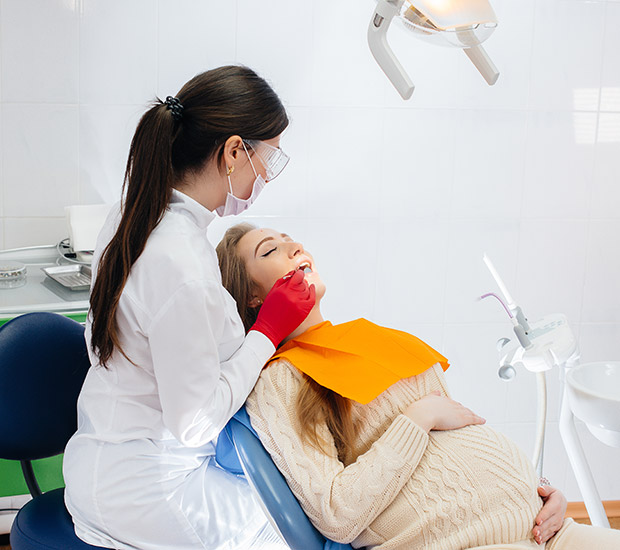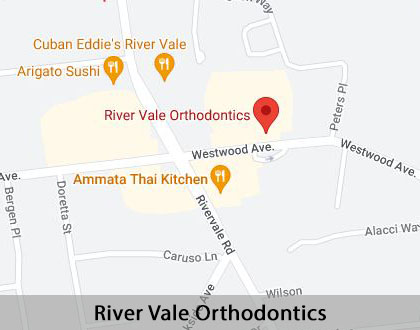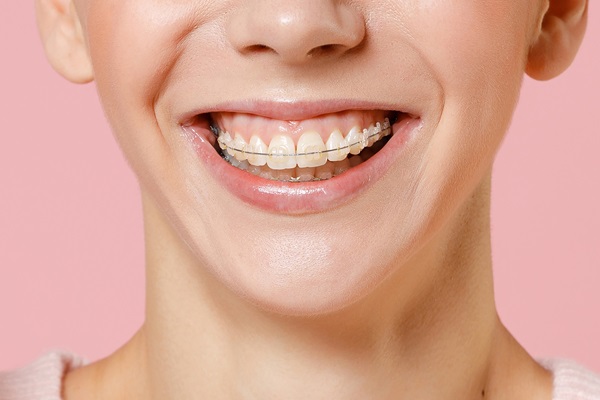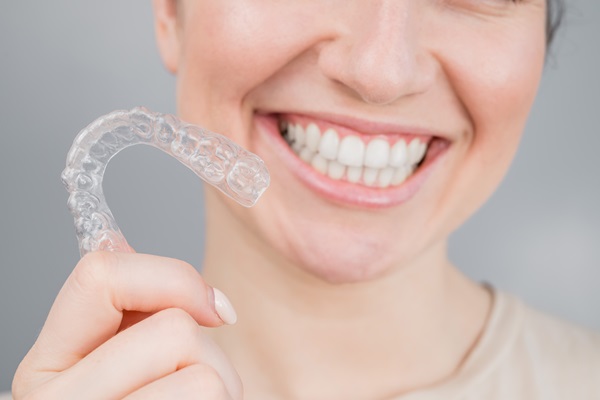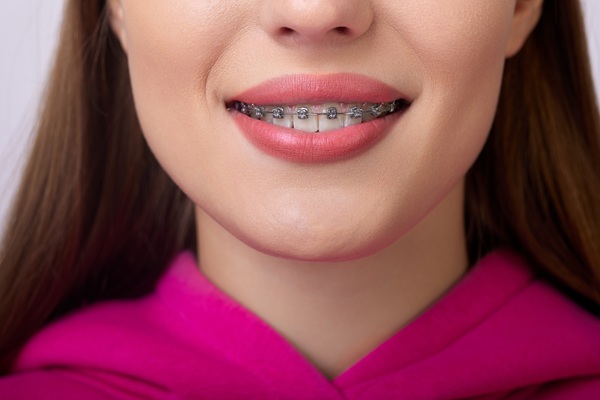Orthodontics During Pregnancy River Vale, NJ
Pregnancy is an exciting time filled with questions and uncertainty. Orthodontic treatment might be one of them. Whether you are considering getting braces during pregnancy, or are undergoing orthodontic treatment already, do not worry. It is safe to get braces while pregnant or to continue your treatment. In fact, you might be surprised to learn this might be the right time to get orthodontia.
By following a few simple precautions, women who are currently pregnant, or thinking of becoming pregnant, can have orthodontic treatment with no risk to themselves or their baby. Our staff at River Vale Orthodontics in River Vale and the surrounding area is well equipped to handle orthodontics for pregnancy. Call us at (201) 613-1100 to discuss your treatment options.
Available Treatment Options
While it is possible to undergo or continue orthodontic treatment during pregnancy, it is important for patients to let our orthodontist know if they are pregnant or planning to become pregnant. Any changes in the patient’s health can affect the approach to their care. It is also important to have a conversation with the obstetrician so they can coordinate any necessary care with our orthodontist.
The many orthodontic treatment options available to adults are still a choice for women who are pregnant or looking to become pregnant. There is no research that shows braces or the materials used to attach them have any negative effects. Even the materials used to make impressions of the teeth before braces are okay to use while pregnant.
Traditional metal braces remain a popular option, along with clear ceramic braces or plastic customized aligners worn over the teeth. These invisible aligners can be removed during eating and while brushing and flossing. No matter what option you choose, all of the materials used will not harm the patient or the baby.
“The many orthodontic treatment options available to adults are still a choice for women who are pregnant or looking to become pregnant.”
Benefits of Orthodontics During Pregnancy
Believe it or not, pregnancy may actually be the right time to start orthodontic treatment. Getting braces during pregnancy means your treatment will likely be done by the time your child is a toddler, which can be a challenging stretch. Additionally, it is easier to schedule orthodontic appointments before a new baby arrives.
If you have always had good dental appointments in the past, it might come as a surprise to you if you experience some oral health issues during pregnancy. Hormonal changes often affect your body’s reaction to plaque and germs. While brushing and flossing are important for everyone, it’s especially important for expectant mothers undergoing orthodontia.
Additional issues may include gum inflammation or swelling between the teeth. Your teeth may also become slightly loose during pregnancy. This does not mean you are at risk of losing any teeth. They will reattach once the baby arrives, but our orthodontist will consider the possibility of these changes when developing a treatment plan. These minor complications may necessitate additional orthodontics appointments.
“Believe it or not, pregnancy may actually be the right time to start orthodontic treatment.”
Braces, Pregnancy and Diet
Women who are pregnant need to be especially cognizant of their diet to make sure they are getting the recommended amount of nutrients. Like anyone who wears braces, expectant mothers need to avoid eating hard, sticky, or crunchy foods that can break brackets and wires. This includes ice, which may be tempting to chew on to help relieve swollen gums.
Protein is especially important during pregnancy. However, the main sources of protein, like red meat, can be difficult to chew. Some braces-friendly protein sources are eggs, chicken, cheese and yogurt. Fish is also a great protein source, so long as the patient avoids any that may contain mercury, such as swordfish. If a patient eats a plant-based diet, they should consider chickpeas and beans. Instead of biting into foods like apples, you should cut them into small pieces before eating.
“Like anyone who wears braces, expectant mothers need to avoid eating hard, sticky, or crunchy foods that can break brackets and wires.”
Check out what others are saying about our orthodontic services on Yelp: Orthodontics During Pregnancy in River Vale, NJ
Procedures and Pregnancy
Getting braces during pregnancy often involves a few more procedures than average. You may have to visit the orthodontist more often for wire adjustment to account for any pregnancy-related weight gain. A new mold of your mouth and teeth may also be needed to account for any significant changes.
X-ray images are often needed during orthodontic treatment. While that may be concerning, research has shown dental X-rays pose no risk to an unborn child. A protective device will be placed over your abdominal area to ensure your baby is not exposed to any radiation.
Maintaining proper oral hygiene is important during pregnancy but is even more vital if you also have orthodontic appliances. Pregnant women are more susceptible to gingivitis and cavities. Our staff will go over proper care for braces and oral hygiene with the patient. This includes how to keep the gums healthy.
“Getting braces during pregnancy often involves a few more procedures than average.”
Questions Answered on This Page
Q. What are the orthodontic treatment options available during pregnancy?
Q. Why should I consider getting braces during pregnancy? How can pregnancy affect my teeth?
Q. What can I eat when I am pregnant with braces?
Q. Does pregnancy affect orthodontic procedures?
Q. How can morning sickness affect braces?
People Also Ask
Q. Does braces treatment differ in adults and children?
Morning Sickness and Braces
Morning sickness is a common condition experienced by many expectant mothers. Not only does it make you feel awful, but excess acid from stomach bile can weaken and cause permanent damage to teeth enamel. If you are expecting and considering braces, try to wait and start treatment after the first trimester of pregnancy if possible. By the second trimester, morning sickness symptoms typically decline.
If you already have braces, rinse your mouth with water after a bout of morning sickness to neutralize the acid in your mouth. Leaving this acid on your teeth may increase your risk for enamel erosion that is not noticeable until after the braces are removed. Our staff can also recommend fluoride mouth rinses and special toothpaste that can help protect your teeth.
You should contact your primary care physician (PCP) or obstetrician if your morning sickness does not improve after the first trimester. It is also important to make sure your physician and orthodontist are coordinating their care. You should contact your PCP if the orthodontist wants to prescribe any medication, or if there has been a noticeable elevation in your blood pressure. Conversely, your physician can let the orthodontist know if there are any complications that could affect your treatment.
“Morning sickness is a common condition experienced by many expectant mothers.”
Frequently Asked Questions About Orthodontics During Pregnancy
Q. Is it safe to get braces during pregnancy?
A. It is okay to get braces while pregnant or continue your treatment if you find out you are pregnant during braces treatment. In fact, this might be the right time to get orthodontia. Getting braces during pregnancy means your treatment will likely be done by the time your child is a toddler, which can be a challenging period. Additionally, it is easier to make orthodontic appointments before a new baby arrives.
Q. What are the available treatment options?
A. The possible orthodontic treatment options available to adults are still okay for women who are pregnant or looking to become pregnant. There is no research that indicates braces or the materials used to attach them have any negative effects. Even the materials used to make impressions of the teeth before braces pose no risk.
Q. How does pregnancy affect my teeth?
A. If you have always had good dental appointments in the past, it might come as a surprise to you if you experience some oral health issues during pregnancy. Hormonal changes often affect your body’s reaction to plaque and germs. While brushing and flossing are important for everyone, it is especially important for expectant mothers undergoing orthodontia.
Q. Do I need to watch my diet?
A. Women who are pregnant need to be especially cognizant of their diet to make sure they are getting the recommended amount of nutrients provided by their doctor. Like anyone who wears braces, expectant mothers need to avoid eating hard, sticky or crunchy foods that can break brackets and wires. Protein is especially important during pregnancy; however, the main sources of protein, like red meat, can be difficult to chew. Some braces-friendly protein sources are eggs, chicken, cheese, and yogurt.
Quality Orthodontic Services Can Transform Smiles
By visiting us as soon as possible, our team can help get you the professional treatment you need.
Definition of Orthodontic Terminology
Call Us Today
Getting braces during pregnancy is a safe option that may end up saving you time in the long run. As long as you follow good oral hygiene, eat a healthy diet, and pay attention to your general health, you can fulfill your desires for a straight, healthy smile. To learn more about orthodontics for pregnancy, call us at 201-613-1100 to speak to our staff about the available options.
Helpful Related Links
- American Dental Association (ADA). Glossary of Dental Terms. 2021
About our business and website security
- River Vale Orthodontics was established in 2023.
- We accept the following payment methods: American Express, Cash, Check, Discover, MasterCard, and Visa
- We serve patients from the following counties: Bergen County
- We serve patients from the following cities: River Vale, Westwood, Norwood, Old Tappan, Emerson, Woodcliff Lake, Montvale, Park Ridge, Washington Township, and Harrington Park
- Norton Safe Web. View Details
- Trend Micro Site Safety Center. View Details
